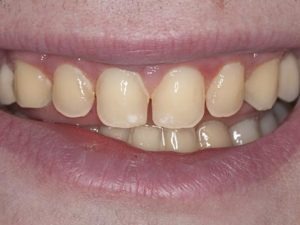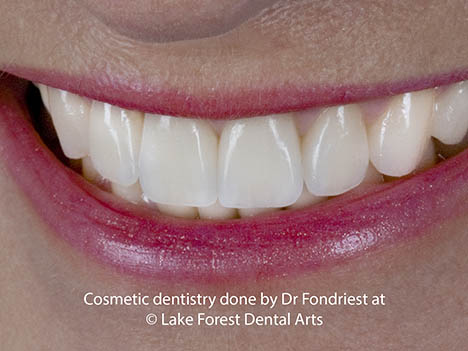
When your front teeth are yellow no matter how much you brush, it may be that you have lost your tooth enamel. Enamel erosion or abrasion is the thinning out of the outer coating over your teeth. The average tooth has about 2 millimeters of enamel on the chewing surfaces and 1.5 mm on the front surfaces. Underneath the enamel surface of a tooth is dentin. The majority of the tooth is made up of dentin. Dentin is more yellow and is less hard. While enamel is a very hard and dense surface, dentin is soft and will accept stains easily. Common bleaching doesn’t work as well on dentin as it does on enamel.
Are my yellow teeth stained?
When you see that your smile looks quite yellowed in the mirror, you may immediately assume that this esthetic issue is the result of staining. Oftentimes, this yellowing is from enamel loss. When you have lost your tooth enamel, the teeth need to be covered to be made brighter and for protection.
Normally your dentist will suggest something like veneers or porcelain crowns to fix your grin. In the case of severe erosion, your teeth may indeed have staining. However, much of the yellow you’re seeing is the result of your dentin becoming more visible. Dentin is the darker tooth layer beneath your brighter protective surface. Dentin does not bleach as well and is usually covered over.
Why Has Enamel Erosion Occurred?
You may be somewhat shocked that you need something like porcelain veneers or teeth crowns for your smile when you figured that all you were going to need was teeth bleaching. What causes enamel erosion? Here are some possibilities:
- Acid erosion breaks down your enamel over time. When you’re consuming a large or consistent quantity of acidic drinks (juice from citrus fruits, soda, sports drinks, alcoholic beverages), you’re nursing them throughout the day, or you’re not mindful about rinsing or brushing afterwards, they erode your tissue. Drinking through a straw will reduce the amount of liquid that touches your teeth. GERD is another cause enamel loss.
- Physical erosion is also a serious possibility, which happens from something rubbing against your teeth. If you’re quite aggressive with your brushing, for example, you can erode your teeth.
Tooth Enamel Erosion
There are several things besides cavities that cause the loss of enamel. There is tooth erosion, abrasion, and attrition. All of them are a form of tooth wear and all of them compromise your dental health. If you’re a parent and are concerned about your children’s teeth, it’s important to be aware of tooth erosion and what causes it.
Acidic Beverages cause enamel erosion
It’s common knowledge that soda is high in sugar which is bad for your teeth, but did you know that the acids in soda and other beverages are just as damaging? It was once thought that as long as you rinsed your mouth with water, or brushed your teeth within an acceptable period of time after consuming soft drinks, you could combat the effects of sugar. However, that does nothing to combat the effects of acid on your teeth. According to studies acid damages your dentition within the first 30 seconds of sipping the beverage. Prevent enamel loss by avoiding these beverages:
- Diet soda
- Regular soda
- Fruit juices
- Sports drinks
- Wine
Children and Tooth Erosion
Enamel erosion is on the rise among children, and it can cause serious long-term repercussions. It’s difficult to tell if your child has a problem with erosion until the damage becomes noticeable, and once it happens it can result in extensive and expensive dental treatments. That’s why it is important to try to prevent it. Other causes of tooth erosion include:
- Acid Reflux: Children often have acid reflux that goes undiagnosed. While people sleep, stomach acid can regurgitate up through the esophagus and into their mouth causing erosion when coming into contact with their teeth.
- Bruxism: Bruxism is the grinding and/or clenching of teeth. It tends to be common in children and can cause permanent tooth wear.
What Can Be Done About Lost Tooth Enamel?
Teeth can be extremely sensitive if you have enamel erosion. Depending on the severity of your erosion, we may suggest porcelain veneers to camouflage the esthetic damage or we may suggest porcelain crowns to rescue your teeth from tooth decay. We also offer cosmetic bonding. Remember that your reasons for improvement become twofold with erosion. First, you want to cover up the stains and the visible dentin, so your teeth look bright and white again. Second, you want to reconstruct the missing outer layer to ensure your teeth are strong, nerves are protecting, and your smile is in good shape for daily use!

What are the consequences of lost tooth enamel?
Enamel is the hardest tissue in the human body and protects the tooth from wear and tear. The outer layer of enamel also gives your teeth their shape. Loosing your outer layers can lead to big problems. When the outer layers are lost, food will pack between the teeth threatening your oral health. Oral care habits such as brushing and flossing become more important. Gum disease can develop easily.
Can enamel erosion be fixed?
Lost tooth structure can be replaced with veneers or bonding. Both options can recreate the original shapes of your teeth. The main difference between the two is the service life. Veneers will last 20+ years and bonding will last up to 7 years.
How Can I Get Started?
A cosmetic consultation will allow you to learn all about your smile, your discoloration from enamel erosion, and to land on a treatment plan you feel comfortable with (and excited about).
Typically the lost enamel is replaced with either crowns or veneers. An artful aspect of better quality dentistry is achieving an esthetic goal with the least amount of drilling. Crowns and veneers are the two main cosmetic dental options for transforming your smile.
Learn more about enamel erosion
When you know you want a whiter artistic smile but you’re not sure which avenue to take, come on in to discuss your options with our friendly team. Our practice is proud to serve Chicago and all surrounding communities in the Chicago Metro area. To schedule a consultation, call our office at 847-234-0517.
